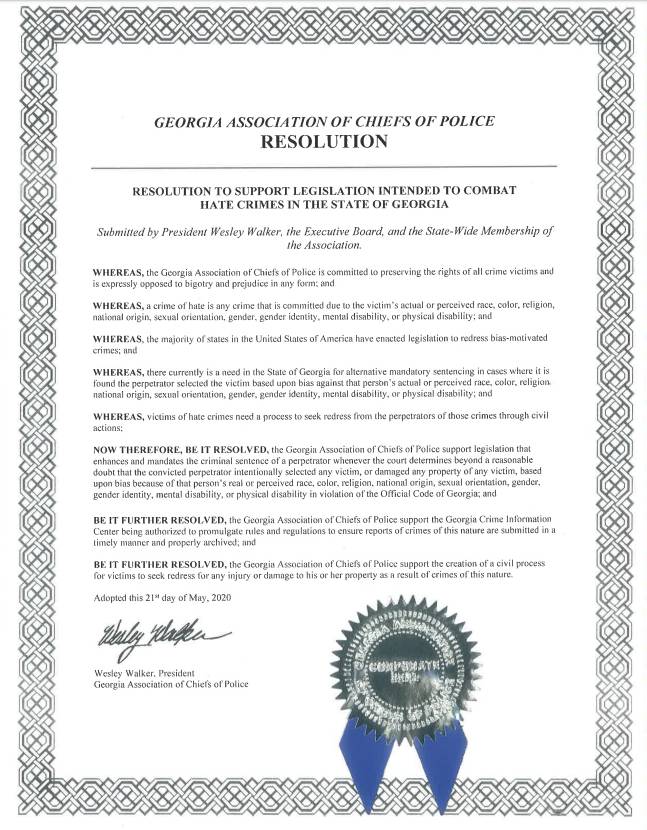
The Georgia Association of Chiefs of Police has announced its support for Georgia’s proposed hate crime legislation.
The resolution proclaiming support asserts that the association is:
- committed to preserving the rights of all crime victims;
- expressly opposed to bigotry and prejudice;
- in support of mandates and enhancers of a criminal sentence of a perpetrator whenever the court determines beyond a reasonable doubt that the convicted perpetrator selected any victim, or damaged any property of any victim, based on upon biased because of that person’s real or perceived race, color, religion, national orientation, gender, gender identity, mental disability, or physical disability.
In 2019, the Georgia House of Representatives voted to approve a bill that would increase penalties for crimes committed against certain classes of people – otherwise known as ‘hate crime legislation.’ The bill never had a committee hearing in the Senate and was assumed to be ‘dead on arrival’ in the upper chamber, but the recently publicity surrounding the Ahmaud Arbery case has the measure back on the table.
Due to Georgia’s two-year legislative session terms, House Bill 426 – sponsored by State Representative Chuck Efstration – can still be considered when lawmakers return on June 11.
When passed in 2019, the measure had the bipartisan support of Republicans Deborah Silcox and Ron Stephens and Democrats Calvin Smyre, Karen Bennett, and Karla Drenner. It passed narrowly with a number of Republicans voting NO.
The measure seeks to toughen punishments for crimes committed “because of the actual or perceived race, color, religion, national origin, sexual orientation, gender, mental disability, or physical disability of such” by creating a new code section, OCGA 17-10-17.
The proposal does not adjust the punishments for any particular crime, but instead allows for a prosecutor to seek additional penalties on the front end of a case, which would require the judge to sentence different upon conviction. specifically, a judge would be required to impose the following penalties for persons convicted of crimes committed because of real or perceived bias:
- Imprisonment for 3-12 months and a fine up to $5,000 for misdemeanor crimes
- Imprisonment for 6-12 months and a fine up to $5,000 for a misdemeanor of a high and aggravated nature
- Imprisonment of at least two years for felonies.
The judge would not be able to impose lesser penalties or use judicial discretion if the new law took effect and a it was determined a person committed a crime under one of the eight new classes. The prosecution, however, would be required to notify the defendant at the time of the indictment or accusation if hate crime enhanced penalties were to be sought, a notification requirement that is already part of the law under OCGA 17-10-18.
A similar bill passed out of the Senate and a House committee in 2018 but failed to make it to the House floor for a vote before the end of the legislative session.
Georgia is one of five states with no hate crime legislation, joining South Carolina, Arkansas, Wyoming, and Indiana. Opponents of hate crime legislation say the intent of a crime is sometimes difficult to prove and classifies individuals differently under the law. Supporters say increased penalties deter crimes.
Lawmakers are slated to return to the Capitol on June 15th.
The GACP also released a statement on the George Floyd incident. The statement is below the resolution.
Resolution to Support Legislation Intended to Combat Hate Crimes 2020 _002_GACP Statement on Minneapolis Use of Force
Jessica Szilagyi is a former Statewide Contributor for AllOnGeorgia.com.


Chattooga Schools
Andy Allen Establishes Jeff Owings Memorial Scholarship

Crime & Safety
GBI Investigates Death in Millen

Bulloch Public Safety
04/09/2024 Booking Report for Bulloch County

Bulloch Public Safety
04/01/2024 Booking Report for Bulloch County

Bulloch Public Safety
04/08/2024 Booking Report for Bulloch County

Bulloch Public Safety
04/15/2024 Booking Report for Bulloch County

Bulloch Public Safety
04/22/2024 Booking Report for Bulloch County






